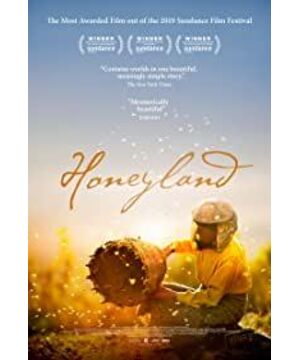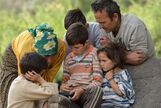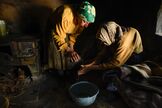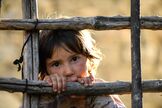The freshly overflowing honeycomb renders the wasteland golden yellow in the sunset. The red turban and yellow dress on the heroine make her look harmonious with the environment. She walks alone on the severely desertified mountain, accompanied by a highly socialized Species of structure - bees, thousands of bees often make a deafening noise when the camera is close, and the slate of the beehive is closed and everything is silent. She really lives outside the crowd and lives by selling a little honey.
A life without support is lonely. The old mother of the protagonist's family is unable to move her home due to hemiplegia, and is forced to adapt to any bad real environment. The film depicts the characters' plight very deeply, and the realistic wind and sand are not enough to convince people. As a result, the erosion of capital on ordinary life cannot be resolved before winter comes.
I admire the director for completing such a simple and powerful film, with very few characters, not much dialogue, and the narrative is simple and concise. For example, the beehive in the crack on the edge of the cliff is actually her open-air safe. When she has nothing, she retains the most sincere gift of nature to people. It is also a kind of person who can be comforted after the pain. sweet. For example, the window sill by the mother's bedside, whether sunlight or candlelight emanates from there, only illuminates the intact half of the mother's face, giving people insight into the director's inner softness.
In fact, from the space, we can see the feelings of the two families towards the land. Although the stone wall house where the hostess lives is simple, every corner of the surrounding area can be reasonably used by her. On the other hand, the neighbors and their families depend on the RV. They set up camp in one place, and when they run out of resources, they pat their butts and leave. The heroine pays attention to the harmonious coexistence between man and nature, while the neighbors are just unsmart laborers who are fascinated by interests. The family of unsmart laborers is both love and hate, and being a villain in reality makes people feel powerless.
There are various social relations between the only two households, farmers and merchants, good and bad, hard-working and lazy, smart and stupid. All kinds of contradictions are not only to resist the erosion of foreign capital, but also to the harm of the people inside because of their own interests.
Where there are people, there is a story, and when people go, the building is empty. The hostess's residence looks like a city-state from a distance, but it is so dilapidated from a closer look. With the death of the mother and the migration of the neighbors, it seems that the people who can get in touch with the heroine are slowly leaving. She enjoys the only fresh honey with a dog. The picture of one person and one dog on the top of the mountain makes the people regret.
Maybe some people don't need those good and bad stories, they can stay away from society, and they can live in harmony with nature when they are alone, and compose the wisdom of mankind. This loneliness is the simplicity and kindness of people.
Such a high-quality documentary wins because the author finds the connection point between them and honey from the mountains, rock walls, rivers and the people who inhabit them. Dig out rich social forms.
View more about Honeyland reviews






